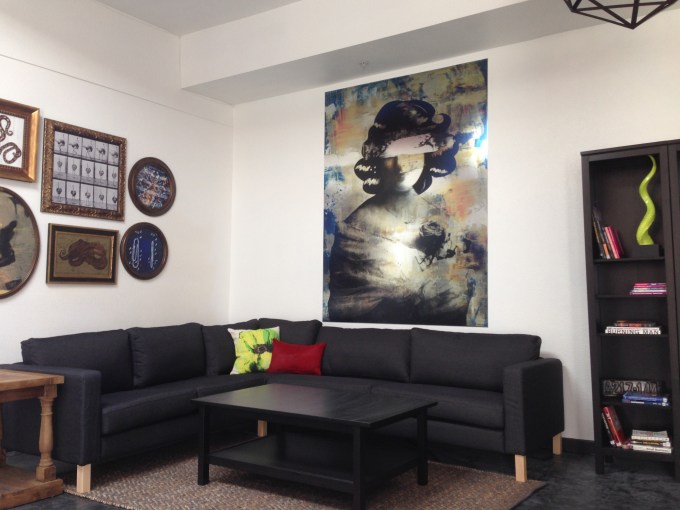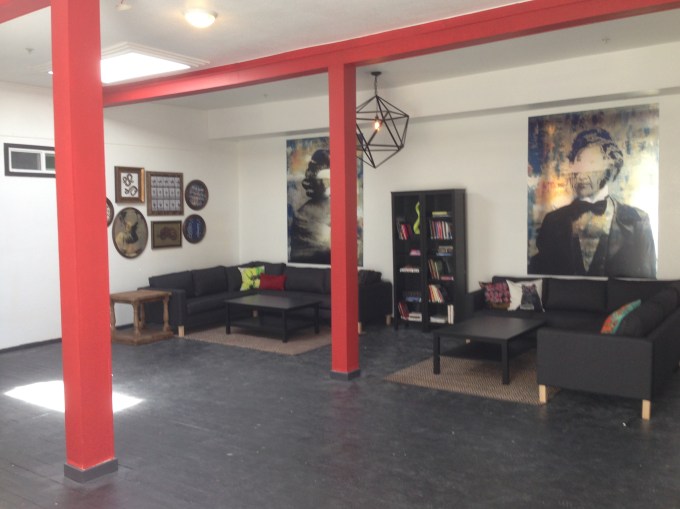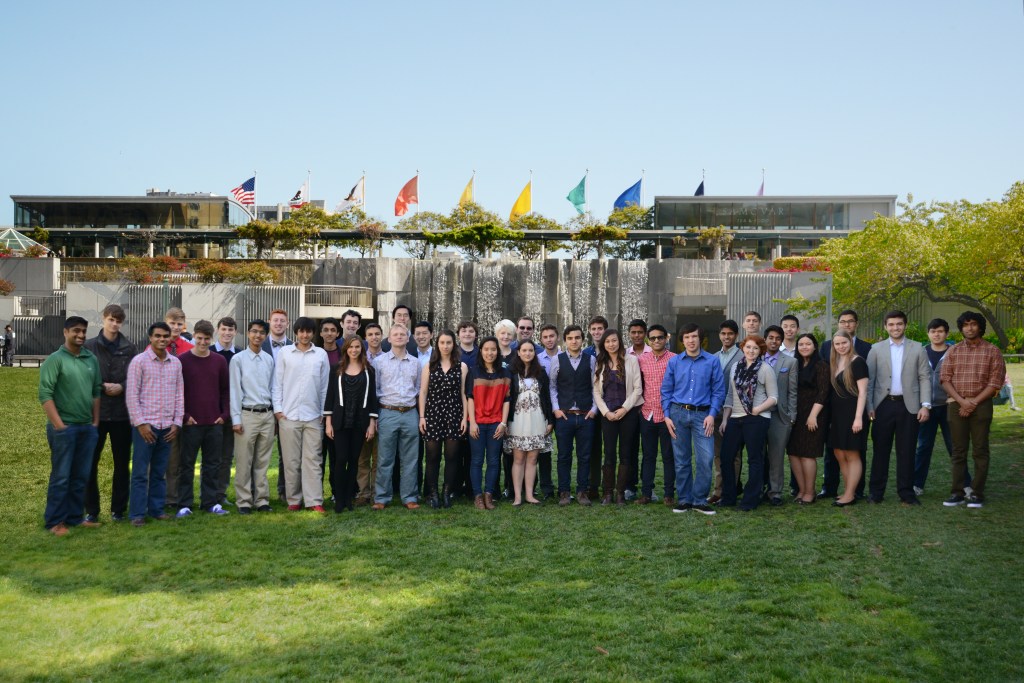Twenty brilliant minds, all under age 20, just started their venture this summer with the Thiel Fellowship program. All of these bright young things were carefully selected from over 1,000 other hopefuls this year to receive $100k in funding so they could drop out of college and embark on a two-year mission to solve the future.
But are they actually doing that or has the Thiel Fellowship Program turned into more of a prestigious two-year sabbatical?
The Mission House

A little over half of the kids (ages 16-19), 10 boys and a girl, live together in what appears to be a giant abandoned building in the sketchier part of San Francisco’s Mission.
The difference between inside and out at their new abode is striking. On the outside, it’s all boarded up and slapped together with old wood panels, graffiti, staples and glue. It looks ready to fall apart at the slightest gust of wind. But step inside and it’s a completely different story. High beam ceilings let in natural light and modern art decorates the entry, hall and living space. There are two kitchens, a laundry, four full bathrooms and 10 bedrooms. The acrid smell of fresh paint lingers, hinting at the newness of this hidden mansion’s refurbished life.


It’s sort of poetic that these kids live in such a place. It’s as if it serves as symbolism for a broken education system remade in Thiel’s visionary future.
Here’s the problem with that vision – 8 of the 20 kids I spoke to in this year’s program said at one point or another in our conversation that they’d consider going back to college after they are done. Even the ones who said they would definitely not go back changed their mind at certain points and said they might also go back. On top of that, some of the kids I spoke to from the previous year also said they would go back or at least might consider it at the end of their two years. This makes a lot of strategic sense for them. According to the US Census, college graduates earn nearly a million more dollars in their lifetime than their peers. Grad school students earn even more than that at $1.3 million above everyone else.
The program gives these kids an opportunity to focus on something, right in the middle of school. It also opens them up to Peter Thiel’s very strong network of contacts that they can use in the future.
A lot of the kids seemed to be using the program as more of a prestigious two year internship, kind of like a Rhodes Scholarship for tech, with scant regard for Thiel’s plan to disrupt higher education.
According to Thiel Fellow spokesman Jeremiah Hall, only 6 of the Thiel Fellows have gone back to college so far. But then, it’s still pretty early to try and predict how many will go back. There are roughly 80 Fellows currently. 40 of them are still in the program. The other 40 are just barely out.
Future Business Leaders of America
Echoing their living space, on the outside the Fellows seem like regular teenagers but inside those normal facades are the minds of geniuses. Fouad Matin, 18, helps kids learn how to code. Lucy Guo, 19, interns at Facebook by day and builds educational software for third world countries in her spare time. 17-year-old Adithya Ganesh co-invented IntentSense, an intelligent bionic glove for partial hand amputees.
About two-thirds of this current crop of Thiel Fellows are first generation Americans. According to a study from Johns Hopkins involving nearly 11,000 kids, immigrant children who came to the U.S. before they were teens do better in school than native-born children. American-born children whose parents were immigrants followed closely in terms of achievement.
Nineteen-year-old Alex Koren, a 6’2 red head, is the oldest and possibly the most outspoken kid in the house. His father is a former Israeli soldier. Matin’s parents immigrated from Morocco, Guo’s came from China. They had high hopes of their daughter earning a PhD. Instead she’s dropped out of school to join the program. While that is what Thiel himself is going for, it wasn’t what Guo’s parents imagined for their daughter. “Oh my parents were pissed,” admits Guo. That’s partly why she took the internship at Facebook on top of the Fellows program. “They said if I didn’t get my PhD and work for Facebook, they’d failed.”
Thiel Fellow spokesman Ross Gillifillan helps pick those in the program. He pointed out that Thiel himself was born in Germany and came to the states as a toddler. According to Gillifillan, bringing in this many children of immigrants was not something the program did on purpose. “It just somehow turned out that way,” he injects. He’s sitting in the back room, observing, keeping the kids on the subject of their startup plans (and possibly away from too many things he doesn’t want the kids talking to a reporter about).
Even with the prestige of the program, the money and the opportunities, many of the other kids with immigrant parents shared a similar story to Guo’s. These people had sacrificed for their children and given up their homeland, all so their kids could go to college. Dropping out and doing something else would be unthinkable to them.
And yet, here these kids are dropping out…at least for two years, with a good lot of them admitting they plan to go back at a later date.
The Future of Education
What was more unthinkable to the teens was not taking this opportunity. “I felt like I was on autopilot,” 19 year old Kaushik Tiwari told me about his experience with college. He hailed from New Dehli and happened to be the only Fellow not born in the US in the house. Koren said something similar about his higher ed experience at Johns Hopkins, “I had three majors, I was class president, working for admissions, blogging for the school…and finishing up my freshmen year. I wanted to be around people actually doing things not around people talking about the theory around doing things.”
Koren was sure he did not want to go back to finish school, but then thought about it mid-conversation and said he wasn’t sure, “I mean, I could change my mind. I just don’t know right now.” It may be too early to tell, with just a month into their endeavors.
While there’s really no structure set for the teens in the program, their work ethic is remarkable. “We all get up around 8,” says Koren. Matin corrects him, “some of us earlier like 6 or 7.” They work from sun up to sun down on their projects, sometimes collaborating or helping each other out when they are stuck. “We owe it to the good of the people of the world to do something with our time here,” says Fellow Shantanu Bala, 19.
Housemate Jared Sumner mentioned his self-imposed discipline came early, “I pretended to be a student at MIT and went to lectures.” Sumner also built a company called Selfstarter, an open-source DIY crowdfunding site competitor to Kickstarter that startups have used to raise $10 million. This was all previous to his time in the Fellows house. He views the Fellows program as a two year education of sorts. “If and when I return to college I can have a new perspective.”
Despite these very big projects, the Fellows still act like typical teens. They watch movies on the house big screen and enjoy eating from the hot dog stand that is open till 3 am just down the street. Guo squeals after she admits she prefers McDonalds. “I can’t help it. One dollar fries!,” she says, laughing and hiding her face.
Guo, at least, seems to have a solid plan in place for her future. Part dutiful daughter, part strategic planner, the only girl in the group already has a marketable startup idea, a Facebook internship under her belt and just one more year of school. Yes, she is one of the kids that plans on going back to finish her degree after she’s done. “The fellowship is not something you win, it’s a chance to focus,” says Guo. And that is exactly what she’s doing with her two gap years.
Updated with comment from Jonathan Cain, President of the Thiel Foundation:
“Whether building a company, digging into their own research, joining an existing team, or even taking knowledge from an institution, we’re trying to help fellows develop long-term careers by supporting them as they work harder and take bigger risks than they might otherwise have been able to. By our math, about 7% of fellows have ultimately returned to school in some capacity; meanwhile, fellows have also generated more than $100 million in economic activity, created hundreds of jobs, and sold companies worth millions.”































Comment